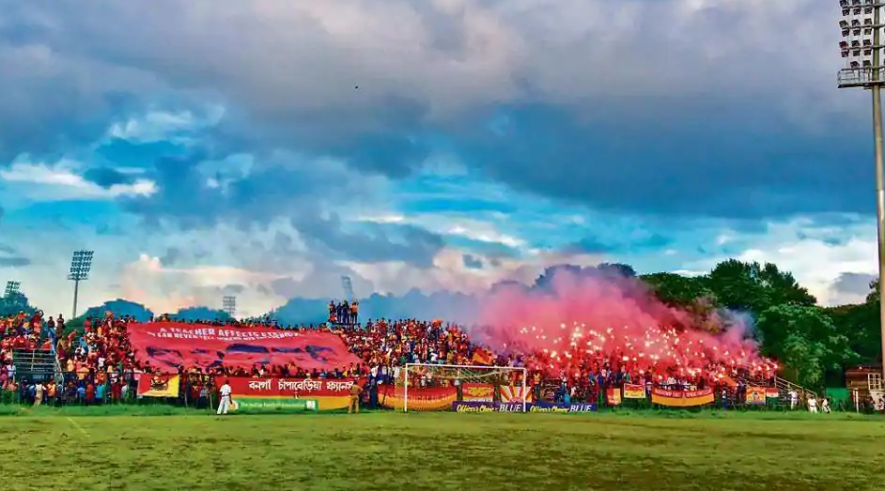East Bengal Faces a New Identity Crisis, Lost In A Web of Its Own Making

East Bengal celebrated their centenary in August last year to great fanfare, while in the background the club’s officials and sponsors engaged in a war that has now come to head (Pic: EB/HT, Twitter).
When East Bengal Club was formed in Calcutta (now Kolkata) in 1920, it was a direct fall out of ethnic rivalry. Little did those officials instrumental in its formation know that one day the ‘sporting activities’ of the club would be up for sale because of corporate considerations.
The story goes that a decent club cricketer, who played for Kolkata’s Jorabagan Club in 1920, was dropped in a key match. Though no official explanation was issued, it was assumed his omission was directly linked with the fact that he came from the eastern part of undivided Bengal.
The people from this region (now Bangladesh) were addressed as ‘Bangaals’ and were regarded as second-class citizens by those who lived in Kolkata and its nearby districts. Furious with the treatment meted out to one of their own, a few elites from east Bengal decided to form a new club almost immediately.
East Bengal’s rise in Indian football since then has been meteoric, though not always smooth. They withstood many a squall including an attempt by the state government to change the club’s name a few years after the partition of the country. But never before has their eligibility to play been brought to question.
Read More | Tour de Resilience: West Indies Take a Big Step Forward, Into the Unknown and the Known
Earlier this month, the All India Football Federation (AIFF) asked East Bengal to inform them officially about their changed ownership to clear the Asian Football Confederation’s (AFC) licensing criteria after their separation from their partners, Quess Corp. Sources say the crucial letter hasn’t been replied to yet.
When asked, an official said: “As per our records, East Bengal are no more the East Bengal club, but Quess East Bengal FC since the club and the investors formed a company in the 2018-19 season.”
“Now that we have definite information that they are set to part ways post May 31, 2020, we need to know where exactly things stand. Unless the records are officially altered with NOCs from both parties, they can’t take part in our competitions this season,” the source added.
AIFF is not the only one whose recognition of the century old institution could be conditional. IFA, the parent body of Bengal football, is expected to use the same logic for East Bengal in the local league.
And why not? Two seasons ago, the East Bengal management of the time had given it in writing that a new company, Quess East Bengal FC Private Limited had been formed with Quess the investors, holding 70 per cent of the shares. It made clear that ‘sporting rights’ of football and cricket rest with the company, which holds the official address at Hemanta Basu Sarani. The iconic club tent at Maidan no longer has a role to play.
Read More | East Bengal Centenary: Euphoric Celebration of the Past Even As Crisis Looms Ahead
Amidst the recent buzz that ‘corporatization’ alone can improve Indian football’s ailing health, the Quess-East Bengal three-year deal looked trendy and fashionable. In reality, the ‘marriage’ proved highly unsuccessful, worse than what was rumoured about the conjugal lives of Meena Kumari and Kamal Amrohi or Dimple Kapadia and Rajesh Khanna.
Quess had upped the ante long ago announcing they would not stay beyond May 31, 2020. Sources, however, claim the investing company was demanding its pound of flesh – they wanted to recover a part of the money they had invested in two seasons.
It wanted East Bengal to buy out the 70 per cent shares Quess are holding – worth around Rs. 8-10 crore. The club neither has the money, nor the ability to attract fresh investors to bail them out.
Very few know the latest situation since officials of both Quess and East Bengal have been tightlipped and refused to speak on the matter. In the meantime, the atmosphere has been truly vitiated by leaks from both sides, accusing the other of violating the agreement.
East Bengal allege they were dragged into a lopsided agreement where they lost sporting rights at all levels – district, state and national. “The investors are yet to pay us Rs. 92 lakh as reimbursement for forming the cricket team. It hasn’t given us nearly one crore towards club expenses and infrastructural expenses, which is part of the agreement. But we stand helpless,” an official said.
Read More | The Indian Premier League: A Monster That Threatens To Consume Its Maker, And Cricket Itself
He added that according to the agreement, the deal could be terminated if money assured is not paid within 90 days. “The agreement nowhere specifies from which date the 90 business days will actually start,” the official added.
The club argue they have been duped thoroughly. The agreement, they point out, clearly says the investors have the right to terminate the contract if the club does not play the ISL or what is the top league of Indian football within three years.
“It is public knowledge that in 2019, the ISL organisers wanted East Bengal to play their league. They held more than one meeting with investors, who flatly refused,” an official complained bitterly. “But for this, the club cannot terminate the contract with investors since the agreement is one-sided.”
But then, the investors, too, can turn around and point out several flaws on part of the East Bengal management. Like in all agreements, East Bengal are supposed to conduct themselves as per the indemnity clause and not demean the partners in public. What their officials did last season was viewed by many as basically an act to sabotage the investors’ plans and damage their reputation.
East Bengal formed a women’s football team without bothering to discuss the idea with investors. They initially even refused to part with the prize money for an Under-19 tournament the club participated in. These slights were never going to help build a relationship with the investors.
Now, as we near a full-scale war between the club and their investors, both parties have suddenly resorted to the copybook. Quess East Bengal FC CEO Sanjit Sen is curt in his response. “Any query you have can only be addressed after July. We are not allowed to speak before that.”
East Bengal official Debabrata Sarkar is more courteous but hardly forthcoming. “You can ask me ten thousand questions, but I may not be able to answer even one. Everything will be okay by July. Our investors’ exit plan will be smooth, we will play ISL, that’s all,” he said.
East Bengal officials can complain they were victims of an agreement that offered them very little and took away their powers. But no one stopped them from studying the finer points of the agreement when they signed the dotted lines. They say the investors appointed a bunch of good-for-nothing people to run the affairs. But a quick glance at the club’s record in the last 10 years doesn’t speak highly of the officials themselves.
At a time when footballers’ salaries have unceremoniously been denied and foreign recruits have bashed the club openly on social media, it is perhaps time to look at the bigger picture. How effective is the current rush to corporatize the game at the club level? Forget about Quess East Bengal, is the experience rewarding even those in the ISL? How many of those corporates, who jumped onto the ISL bandwagon in the inaugural season are still sticking to it?
This is because there is no long-term plan on the table. One side is eager to grab the money available at whatever cost, the other party wants to squeeze out the goodwill in a span of 2-3 years. Very few are interested in taking it to the next level.
The current situation in East Bengal could be an eye opener for the Indian football fraternity. It shouldn’t get unnecessarily influenced by those who preach that money is football’s most important aspect. Actually, it is only one of the many aspects of the beautiful game.
It's a pity that East Bengal officials are yet to realise playing the ISL can’t be the be-all and end-all of the argument. It is more important to protect the identity of the club, fiercely and honestly; corporate glory seekers would automatically be attracted.
Sadly, the current batch of East Bengal officials are in no position to carry on the good work that a bunch of dedicated men began hundred years ago. Because they are living in a house of cards.
Get the latest reports & analysis with people's perspective on Protests, movements & deep analytical videos, discussions of the current affairs in your Telegram app. Subscribe to NewsClick's Telegram channel & get Real-Time updates on stories, as they get published on our website.
























